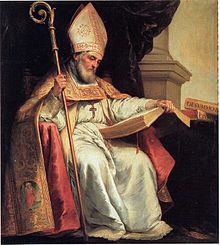Isidore of Seville
Hispano-Roman scholar, theologian and bishop (c. 560–636)
St. Isidore of Seville (or Isidorus Hispalensis; c. 560 – April 4, 636), Archbishop of Seville, was the author of the encyclopaedic [Etymologiae] (or Origines), a work prized during the Middle Ages as a compendium of all human knowledge. He is now accepted by many as the patron saint of computing and the Internet.

| This article on an author is a stub. You can help out with Wikiquote by expanding it! |
| This article about a religious leader is a stub. You can help out with Wikiquote by expanding it! |
Quotes
editEtymologiae
editTranslations and page-numbers are taken from Ernest Brehaut An Encyclopedist of the Dark Ages: Isidore of Seville (New York: B. Franklin, [1912] 1964).
- Litterae autem sunt indices rerum, signa verborum, quibus tanta vis est, ut nobis dicta absentium sine voce loquantur. Verba enim per oculos non per aures introducunt.
- Letters are signs of things, symbols of words, whose power is so great that without a voice they speak to us the words of the absent; for they introduce words by the eye, not by the ear.
- Bk. 1, ch. 3, sect. 1; p. 96.
- Itaque sine Musica nulla disciplina potest esse perfecta, nihil enim sine illa. Nam et ipse mundus quadam harmonia sonorum fertur esse conpositus, et coelum ipsud sub harmoniae modulatione revolvi.
- And without music there can be no perfect knowledge, for there is nothing without it. For even the universe itself is said to have been put together with a certain harmony of sounds, and the very heavens revolve under the guidance of harmony.
- Bk. 3, ch. 17, sect. 1; p. 137.
- Siquidem et per naturam pleraque mutationem recipiunt, et corrupta in diversas species transformantur; sicut de vitulorum carnibus putridis apes, sicut de equis scarabei, de mulis locustae, de cancris scorpiones.
- Many creatures go through a natural change and by decay pass into different forms, as bees [are formed] by the decaying flesh of calves, as beetles from horses, locusts from mules, scorpions from crabs.
- Bk. 11, ch. 4, sect. 3; p. 221.
Quotes about Isidore
edit- Theological necessity was among the main reasons which led St. Isidore of Seville, in the seventh century, to incorporate this theory [of the later development of insects out of carrion, following the initial creation], supported by St. Basil and St. Augustine, into his great encyclopedic work [Etymologiae] which gave materials for thought on God and Nature to so many generations. He familiarized the theological world still further with the doctrine of secondary creation, giving such examples of it as that "bees are generated from decomposed veal, beetles from horseflesh, grasshoppers from mules, scorpions from crabs," and, in order to give still stronger force to the idea of such transformations, he dwells on the biblical account of Nebuchadnezzar, which appears to have taken strong hold upon medieval thought in science, and he declares that other human beings had been changed into animals, especially into swine, wolves, and owls.
- Andrew Dickson White, A History of the Warfare of Science with Theology in Christendom (1896) Vol.1 p. 55.